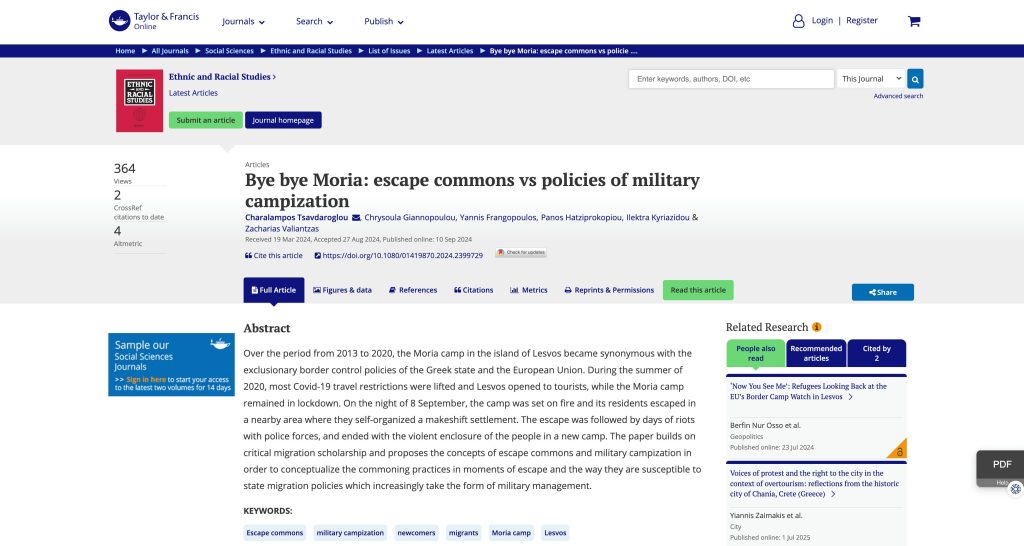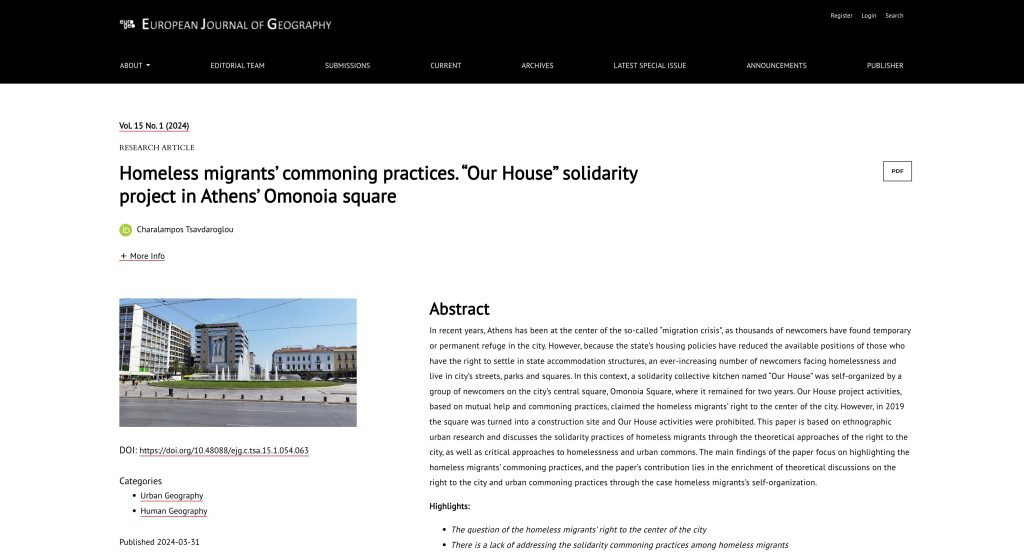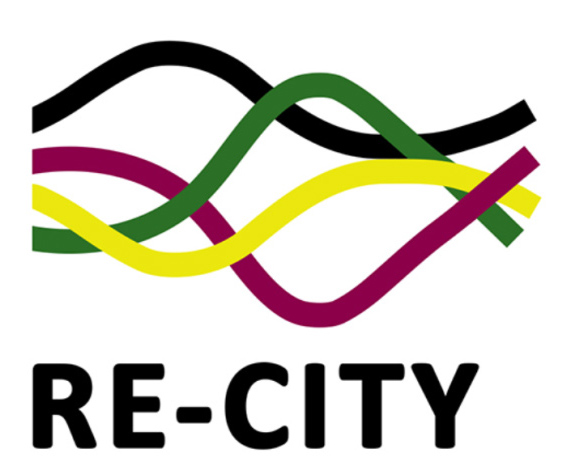Conference Presentations
- Kyriazidou, I. (2024). Instances of care and carelessness for refugees: reconsidering the concept of hospitality in urban Greece. Interdisciplinary Conference: Performing Care and Carelessness, February 14-16, University of Otago, Dunedin, New Zealand + hybrid. programme
- Tsavdaroglou, C. (2023). Solidarity urban commons vs resilient cities. Newcomers’ right to the city in Athens and Thessaloniki. International Conference on Humanitarian Crisis Management (KRISIS 2023), International Hellenic University, October 14-15, Thessaloniki, Greece. programme
- Tsavdaroglou, C. and Hatziprokopiou, P.(2023). Decolonising urban atmospheres. Migrants’ commoning solidarities in Thessaloniki. Conference: Atmospheric Borders, Australian Critical Border Studies, October 4-6, Virtual. programme
- Tsavdaroglou, C. (2023). Hostile vs solidarity cities to newcomers. The refugees’ right to the city in Athens, Mytilene and Thessaloniki. Conference: Solidarity and Support in a Post-Welfare Era, Institute of Ethnology and Anthropology, September 14-15, Skopje, North Macedonia. programme
- Giannopoulou, C. (2023). Criminalizing Solidarity in Lesvos Island, Greece. State and local practices. Seminar on the Border, April 21-24, Podlasie, Gruszki, Polland. programme
Invited Lectures in conferences, summer schools, postgraduate and undergraduate courses
- Tsavdaroglou, C. (2024). Critical approaches on resilience and invention of urban commons. The case of refugees’ accommodation in Athens and Thessaloniki. Lecture in in postgraduate course: Socio-spatial Dimensions of Resilience, Master’s degree in Urban Planning for Sustainable and Resilient Development School of Spatial Planning, Aristotle University of Thessaloniki, April 2, Thessaloniki, Greece. Available here
- Tsavdaroglou, C. (2023). Decolonize the camp. Affective and solidarity geographies of invisible common spaces. Lecture in undergraduate course: Urban Space and Migration Flows, School of Spatial Planning, Aristotle University of Thessaloniki, December 13, Thessaloniki, Greece. Available here
- Tsavdaroglou, C. (2023). Post-democratic governance in refugee camps versus newcomers’ architectural housing commons in Athens and Thessaloniki. Lecture in Migration, Displacement and Belonging research theme, Coventry University, October 3, Coventry, UK. Available here
- Tsavdaroglou, C. (2023). Hostile vs solidarity cities. The newcomers’ right to move and right to stay in Balkan geographies. Lecture in ENLIGHT Summer School “EU border regime(s) and the shrinking spaces of solidarity”, September 19-22, Göttingen, Germany. Available here
Journal Articles (peer review)
- Tsavdaroglou, C., Giannopoulou, C., Frangopoulos, Y., Hatziprokopiou, P., Kyriazidou, I. and Valiantzas, Z. (2024). Bye bye Moria: Escape commons vs policies of military campization. Ethnic and Racial Studies, https://doi.org/10.1080/01419870.2024.2399729

Abstract: Over the period from 2013 to 2020, the Moria camp in the island of Lesvos became synonymous with the exclusionary border control policies of the Greek state and the European Union. During the summer of 2020, most Covid-19 travel restrictions were lifted and Lesvos opened to tourists, while the Moria camp remained in lockdown. On the night of 8 September, the camp was set on fire and its residents escaped in a nearby area where they self-organized a makeshift settlement. The escape was followed by days of riots with police forces, and ended with the violent enclosure of the people in a new camp. The paper builds on critical migration scholarship and proposes the concepts of escape commons and military campization in order to conceptualize the commoning practices in moments of escape and the way they are susceptible to state migration policies which increasingly take the form of military management.
2. Tsavdaroglou, C. (2024). Homeless migrants’ commoning practices. “Our House” solidarity project in Athens’ Omonoia square. European Journal of Geography, 15(1), 54-63. https://doi.org/10.48088/ejg.c.tsa.15.1.054.063

Abstract: In recent years, Athens has been at the center of the so-called “migration crisis”, as thousands of newcomers have found temporary or permanent refuge in the city. However, because the state’s housing policies have reduced the available positions of those who have the right to settle in state accommodation structures, an ever-increasing number of newcomers facing homelessness and live in city’s streets, parks and squares. In this context, a solidarity collective kitchen named “Our House” was self-organized by a group of newcomers on the city’s central square, Omonoia Square, where it remained for two years. Our House project activities, based on mutual help and commoning practices, claimed the homeless migrants’ right to the center of the city. However, in 2019 the square was turned into a construction site and Our House activities were prohibited. This paper is based on ethnographic urban research and discusses the solidarity practices of homeless migrants through the theoretical approaches of the right to the city, as well as critical approaches to homelessness and urban commons. The main findings of the paper focus on highlighting the homeless migrants’ commoning practices, and the paper’s contribution lies in the enrichment of theoretical discussions on the right to the city and urban commoning practices through the case homeless migrants’s self-organization. available in pdf: https://www.recity.gr/wp-content/uploads/2025/09/Tsavdaroglou-C.-2024.-Homeless-migrants-commoning-practices.pdf
